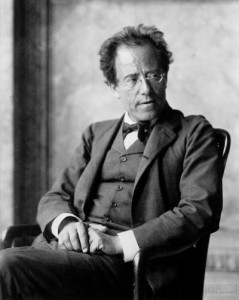Mahler, Symphony No. 7 (Finale)
 I came to Mahler by an unusual path. At least, I always thought it was unusual until I read that Arnold Schoenberg became a fan of Mahler the same way. That is, by way of his Symphony No. 7. I bought the recording that was part of Leonard Bernstein’s first cycle of all nine Mahler symphonies when I was in high school. I had heard Bernstein describe the 7th, and while I don’t remember the actual terms he used, it was clear that it was unusual, unpopular, and somewhat difficult. But Bernstein was advocating for it, and the promotional clip with the opening of the finale had me sold.
I came to Mahler by an unusual path. At least, I always thought it was unusual until I read that Arnold Schoenberg became a fan of Mahler the same way. That is, by way of his Symphony No. 7. I bought the recording that was part of Leonard Bernstein’s first cycle of all nine Mahler symphonies when I was in high school. I had heard Bernstein describe the 7th, and while I don’t remember the actual terms he used, it was clear that it was unusual, unpopular, and somewhat difficult. But Bernstein was advocating for it, and the promotional clip with the opening of the finale had me sold.
Last week we talked about the timpani and, to some extent, its combination with trumpets. And here’s a great example of a symphonic movement that begins with a timpani solo and proceeds to a rousing brass fanfare. As a horn player, there was nothing not to like in that. Unfortunately, with the band as my only available ensemble, it would be some time before I could play Mahler’s works.
But what of Bernstein’s characterization? You can follow the controversy over this symphony in an article by Peter Lefevre:
“Absence of context and disintegration of form are two of the main characteristics of Mahler’s work,” he says, “and are surely his great strengths. The Seventh Symphony is the work in which these characteristics are in clearest evidence, and it is for this reason that the symphony may surely be regarded as one of the most quintessentially Mahlerian of works.”
Thank you, Mr. Berger. Now, if we may call a rebuttal witness to the stand. Deryck Cooke, one of the greatest of Mahler’s champions, considers the finale of the Seventh to be a case of Mahler writing the kind of music that he himself detested, “Kappelmeistermusik,” music of uninspired correctness. Vast is the crowd that hears this as the most un-Mahler-like of his symphonies.
Admittedly, you might find a more congenial introduction to Mahler in his Symphony No. 1 or 4. Maybe the 5th. Save the 9th for later. But the real key to Mahler lies in his Lieder, which is probably a topic we need to look at soon.



